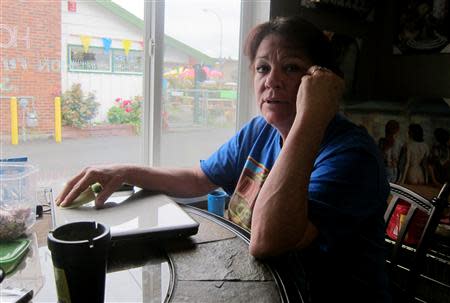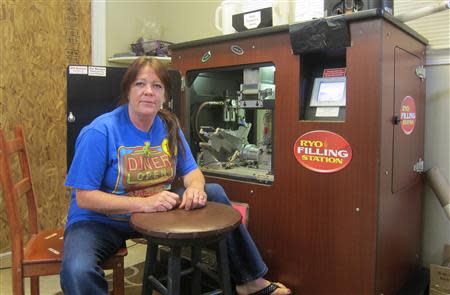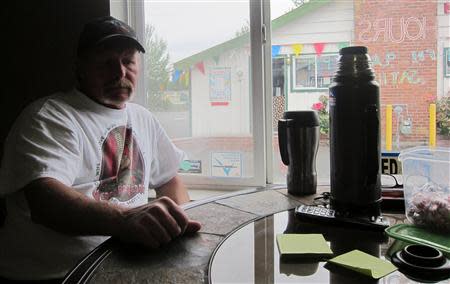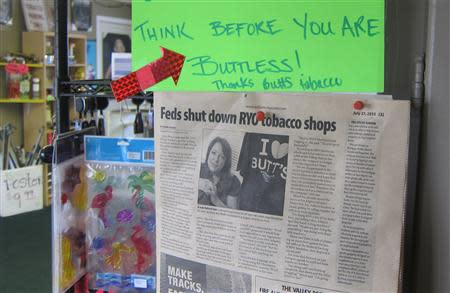Insight: Tax law fuels, then kills, a discount-tobacco industry
By Andy Sullivan AUBURN, Washington (Reuters) - Jean and Larry Wood weren't thinking about politics when they opened Butt's Tobacco in a tidy strip mall south of Seattle in February 2011. They weren't aware that a federal children's health law had inadvertently turbocharged their discount-cigarette business, and they didn't know that a federal highway law soon would destroy it. Washington, D.C., was on the other side of the continent, and it felt even more distant. Over the next 2-1/2 years, Butt's Tobacco would shower Jean and Larry with unexpected riches before eating up their life savings. Along the way, it would deliver a harsh lesson in the ways of American politics. The story of Butt's Tobacco, and the hundreds of similar "roll-your-own" cigarette retail operations that briefly flourished across the United States, illustrates the unintended consequences that can ripple out from Washington as seemingly minor elements of complex legislation change lives and upend established industries. It also illustrates the difficulty of closing a tax loophole once it has been opened. The solution adopted by Congress effectively shuttered many mom-and-pop tobacco retailers, but the tax disparities that first made the business attractive remain in place. As she struggles to stay afloat, Jean Wood has drawn a bitter lesson from the experience. "The guy with the most money wins," she says. THE ACCIDENTAL LOOPHOLE As one of his first acts in office in February 2009, President Barack Obama signed a law that extended health insurance to children who lacked coverage. The Children's Health Insurance Program Reauthorization Act raised cigarette taxes from 39 cents to $1.01 per pack. To discourage smokers from switching to other forms of tobacco to avoid the tax, loose cigarette tobacco and small, cigarette-like cigars were taxed at the same rate. Lawmakers thought cigarette smokers weren't likely to switch to pipe tobacco and large cigars, so they taxed those forms of tobacco at a lower rate. They were wrong. Shortly after the law took effect, tobacco manufacturers changed their product lines to avoid the higher tax rates, according to internal company documents obtained by the U.S. House of Representatives Energy and Commerce Committee. Cigar makers increased the size of their small cigars to meet the federal definition of a "large cigar" and thus qualify for the lower tax rate, according to the committee. Companies that sold loose cigarette tobacco had it easier - in some cases, they simply relabeled their existing product as "pipe tobacco," documents show. That subjected them to taxes of $2.83 per pound, rather than $24.78 per pound they would have to collect for cigarette tobacco. Meanwhile, an Ohio manufacturer had developed a machine that would make loose tobacco more appealing to many consumers. The RYO Filling Station could turn a bag of loose tobacco into a carton of 200 finished cigarettes in about 15 minutes, compared with the hours it would take someone to roll that many smokes by hand. The machine wasn't built to exploit the loophole. It hit the market in 2008, well before the new taxes took effect. Developer Phil Accordino required retailers to use the machine in a way that would minimize their exposure to a separate set of taxes. By requiring customers, not store employees, to operate the $32,000 machine, shop owners could argue that they were not liable for taxes on pre-made cigarettes because they were providing a service for customers who otherwise would roll their smokes by hand. Together, the new machine and the low-tax "pipe" tobacco made a compelling value proposition, enabling consumers to walk out the door with a carton of cigarettes at one-third the cost of premium, factory-made cigarettes such as Marlboro and Camel. "I thought, 'Wow, that's an equation that makes sense in a bad economy - people are saving money for a product they're addicted to,'" said entrepreneur Joe Baba, who sold 120 RYO machines in the Pacific Northwest as a distributor for the company. Jean and Larry Wood, both 51, were among his customers. They cashed out Larry's $75,000 pension from his former job as a sprinkler-system installer, bought an RYO machine and opened up Butt's Tobacco in Edgewood, Washington, a blue-collar city near their hometown of Auburn. Customers could get a carton of cigarettes made from pipe tobacco for $36, compared to $80 or so that other retailers charged for a carton of Marlboros. The Woods cleared $15 on each carton sold. Butt's Tobacco was an immediate success. The Woods took in $312,000 in revenue during their first year, enough to open up a second store in Auburn. Customers would gossip or watch TV while they waited to use the rolling machine, which often was booked days in advance. Their kids got free coloring books and candy. "It was really fun," Jean said. "Smokers are really relaxed people, more so than nonsmokers." Baba had warned the couple that their business might suffer if lawmakers decided to raise taxes on pipe tobacco. But they figured that wouldn't happen for at least five years or so. AN UNLIKELY ALLIANCE By early 2012, the impact of the children's health law on the tobacco market was clear. Congressional researchers said it had shifted price-sensitive consumers toward lower-taxed forms of tobacco, depriving the U.S. government of up to $1.1 billion in lost revenue in the 18 months after the law was enacted. Meanwhile, 2,000 RYO Filling Stations were humming away in smoke shops across the nation. The U.S. Alcohol and Tobacco Trade and Tax Bureau estimated that each machine cost the government $156,000 a year in lost cigarette-manufacturer taxes, on top of the money lost to the pipe tobacco loophole. That agency had ruled in September 2010 that roll-your-own operators like the Woods should have to pay the taxes levied on conventional cigarette manufacturers. But a federal judge suspended the rule while the issue played out in court. The new landscape created allies among powerful groups that more often squared off as adversaries. Convenience-store operators said the new competitors were unfairly exploiting a tax loophole. Public-health advocates worried that the roll-your-own shops were undermining their goal of curbing the top preventable cause of death in the country. Big cigarette makers saw a threat to their core business. "These low-priced alternatives are clearly affecting the reported decline of cigarette industry volume," RJ Reynolds president Andrew Gilchrist told investors in November 2011. As cigarette sales had fallen steadily during the past decade, tobacco giants had fiercely fought the tax increases that they feared would prompt more smokers to quit. The tobacco companies had been unable to block the 2009 federal tax increase, but they have had more success in recent years as dozens of conservative Tea Party Republicans won legislative office on small-government, anti-tax platforms. Altria, the owner of Marlboro cigarettes maker Philip Morris, says it helped defeat 25 proposed tax increases in 2011 and 2012. In Congress, Democrats proposed eliminating the tax loophole by equalizing tax rates across all forms of tobacco. But Republicans blocked the measure on the grounds that it would amount to a tax increase, Democratic aides say. So tobacco companies and public-health advocates, usually fierce adversaries, agreed on a solution: They would not try to raise taxes on pipe tobacco, but would press lawmakers to write a law that would require roll-your-own tobacco sellers to pay the manufactured-cigarette taxes that they had managed to fend off in court. Roll-your-own retailers would not be liable for back taxes on the sales they had already made. "Every now and then there are things (tobacco companies) happen to support that we know will improve public health," said Danny McGoldrick, a vice president at the Campaign for Tobacco-Free Kids. Convenience-store trade groups, representing 150,000 stores in all 435 congressional districts, led the effort. The coalition launched a state-by-state lobbying effort and pressed Congress to take up the issue. Roll-your-own cigarette sellers fought back at the state level. In Washington state, Jean Wood testified before the legislature, arguing that imposing a manufacturers' tax would eliminate 1,900 jobs across the state. She and her husband helped to collect 300,000 signatures to bolster their argument. But in the halls of the U.S. Congress, the retailers were badly outgunned. "I lobbied in Washington multiple times, and everyone I talked to said the same thing: 'You're going to get screwed here and there's nothing you can do about it because there's too much money against you,'" said Accordino, the RYO manufacturer. Federal lobbying records show that Accordino's company spent $250,000 to make its case in 2011 and 2012. The National Association of Convenience Stores, by contrast, spent $8.1 million on lobbying during that period. Tobacco companies spent more than $80 million, on everything from trade agreements to health regulations. They found a sympathetic ear in Republican Representative Diane Black of Tennessee, who introduced a bill that would require roll-your-own cigarette retailers to pay the manufacturers' tax. It drew the support of 75 other lawmakers in the U.S. House. It also drew the attention of Democratic Senator Max Baucus of Montana. The powerful chairman of the Senate Finance Committee had written the tobacco tax increases into the health law, and he was unhappy with the way they were playing out. He also was looking to find a way to help local governments pay for roads and schools in rural areas where the federal government owns large swaths of land. Budget analysts said Black's measure would boost federal tax revenue by $94 million over 10 years. As the Senate debated a sweeping transportation bill in early 2012, Baucus proposed using Black's approach to partially offset the cost of the rural-government funding. His amendment passed the Senate by a vote of 82-16 and was added to the transportation bill, which easily passed the Senate and House. Roll-your-own operators felt blindsided. They had made their case at the state level but said they were not prepared to fight a provision that was tucked into an unrelated law with little public debate. "We were outmuscled and outspent by Big Tobacco," said Baba, the RYO distributor. Those on the other side of the fight say convenience stores, not tobacco companies, did most of the heavy lifting. "Big Tobacco did not crush them. Main Street crushed them," said Corey Fitze, a lobbyist with the National Association of Convenience Stores (NACS). JOBS GONE, LOOPHOLE REMAINS The new law required Butt's Tobacco to collect an additional $30.66 in federal and state taxes on each carton of cigarettes it sold. Price-conscious smokers could find cheaper smokes at the nearby Muckleshoot Indian reservation. Jean and Larry Wood sold 49 cartons in June, roughly what they used to sell in one day. They returned their manufacturing license last month, and their RYO machine now sits unused in the back of the store. The retirement fund that Larry built up over 25 years is gone. With one store shuttered, they hope electronic cigarettes and marijuana pipes can generate enough income to cover their $1,000 monthly lease at their remaining location. "I never knew a lot about politics until this, and I can tell you it is so crooked," Jean said. "Anything can be bought." A year after the rule took effect, the roll-your-own industry has been nearly wiped out. Baba, the machine distributor, estimates that the change has eliminated 10,000 retail jobs across the country. It's not clear whether the new requirement has led to more tax revenue, as Baucus promised. The Treasury Department has collected $12.7 billion in taxes from smokable tobacco products so far this year, down 6 percent from the same period last year. The government now collects less revenue from pipe tobacco and roll-your-own cigarette tobacco. Regulators have been unable to come up with a formal definition that would specifically define the difference between the two types of tobacco. Although roll-your-own retailers now face the same manufacturers' tax imposed on factory-made cigarettes, the loophole that taxes pipe tobacco and small cigars at a lower rate remains in place. That benefits the small manufacturers who produce loose pipe tobacco, as well as retailers that sell the product to cost-conscious cigarette smokers who now have to roll their own at home. It also helps giants such as Altria, which makes the Black and Mild cigars that account for 30 percent of the low-tax "large cigar" market. Efforts to equalize tobacco taxes have gone nowhere in Congress. Altria and RJ Reynolds, the maker of Camel cigarettes, issued identical statements in response to questions from Reuters and declined further comment. "We supported the retail coalition led by NACS to correct this issue and were pleased when Congress closed a loophole it had created," both companies said. Phil Accordino, the RYO manufacturer, says the legal and lobbying battles around his business ate up all of his profits. With a bare-bones operation, he is now trying to crack the market in Europe, where hand-rolled tobacco is more prevalent and popular brands such as Marlboro are available in pouch form. The tobacco makers who drove him out of business in the United States are eager to work with him over there, he says. (Editing by David Lindsey and Claudia Parsons)




